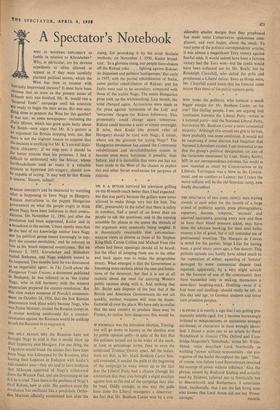THE ONLY REASON why the Russians have not brought Nagy
to trial is that it would show up their hypocrisy over Hungary. For one thing, the Yugoslays would break the silence they have kept since Nagy was kidnapped by the Russians, after leaving their Legation in Budapest with Kadar's safe-conduct pass—they are said to have evidence that Mikoyan approved of Nagy's withdrawal from the Warsaw Pact, and are. threatening to use it if he is tried. Then there is the problem of Nagy's rival Rakosi, now in exile. His position since the revolution has oscillated like a-pendulum. Ortho- dox Marxists officially condemned him after the rising, for provoking it by his cruel Stalinist methods; on November 1, 1956, Kadar broad- cast : 'ln a glorious rising, our people have shaken off the Rakosi yoke . . . fighting against Rakosi- ite despotism and political hooliganism.' But early in 1957, with the partial rehabilitation of Stalin, came partial rehabilitation of Rakosi; and his faults were said to be secondary, compared with those of the traitor Nagy. The entire Hungarian press took up the whitewashing. Last month, the wind changed again. Accusations were made in the press against 'extremists of the Left' and `sectarians' (jargon for Rakosi followers). This presumably could change again tomorrow; Rakosi could become a saint or sinner overnight. If saint, then Kadar (the present ruler of Hungary) should be tried with Nagy; if sinner, where are the grounds for trying Nagy? The Hungarian revolution has caused the Communist rehabilitation and de-rehabilitation system to become even more ludicrous, if possible, than before; and it is incredible that more use has not been made in the West of the chance to exploit this and other Soviet weaknesses for purposes of ridicule.
* * *






























 Previous page
Previous page